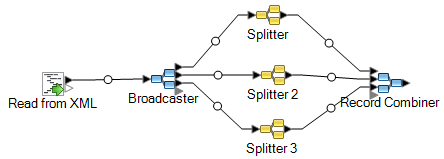Flattening Complex XML Elements
Most stages in a dataflow require data to be in a flat format. This means that when
you read hierarchical data from an XML file into a dataflow, you will have to
flatten it if the data contains complex XML elements. A complex XML element is an
element that contain other elements or attributes. For example, in the data file the
<address> element and the <account> element
are complex XML elements:
<customers>
<customer>
<name>Sam</name>
<gender>M</gender>
<age>43</age>
<country>United States</country>
<address>
<addressline1>1253 Summer St.</addressline1>
<city>Boston</city>
<stateprovince>MA</stateprovince>
<postalcode>02110</postalcode>
</address>
<account>
<type>Savings</type>
<number>019922</number>
</account>
</customer>
<customer>
<name>Jeff</name>
<gender>M</gender>
<age>32</age>
<country>Canada</country>
<address>
<addressline1>26 Wellington St.</addressline1>
<city>Toronto</city>
<stateprovince>ON</stateprovince>
<postalcode>M5E 1S2</postalcode>
</address>
<account>
<type>Checking</type>
<number>238832</number>
</account>
</customer>
<customer>
<name>Mary</name>
<gender>F</gender>
<age>61</age>
<country>Australia</country>
<address>
<addressline1>Level 7, 1 Elizabeth Plaza</addressline1>
<city>North Sydney</city>
<stateprovince>NSW</stateprovince>
<postalcode>2060</postalcode>
</address>
<account>
<type>Savings</type>
<number>839938</number>
</account>
</customer>
</customers>This procedure describes how to use Splitter stages to flatten XML data containing multiple complex XML elements.
The data flow is now configured to take XML input containing records with complex XML elements and flatten the data. The resulting records from Record Combiner can be sent to any stage that requires flat data. For example, you could attached the Record Combiner stage to a Validate Address stage for address validation.
